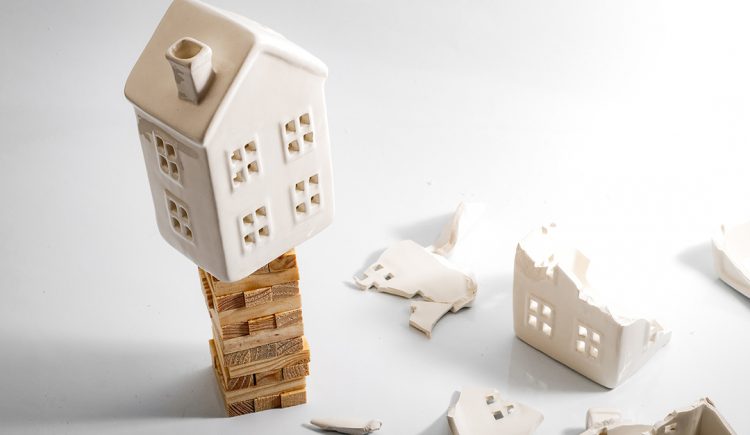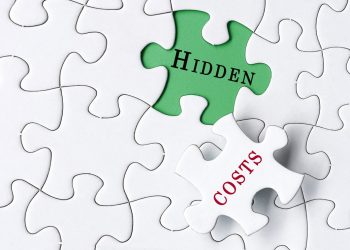With the real estate market experiencing surging prices, scant inventories and a backlog of new home construction, many consumers are wondering if what’s gone up must come back down—in other words, are we headed for another housing market crash? Let’s take a closer look.
Think Back to the Great Recession
The unforeseen housing market crash 15 years ago ignited a worldwide recession. Fueled by low interest rates, loose mortgage-lending standards and the nation’s unshakeable faith in homeownership, home values rose at record rates year-after-year. When the housing bubble burst, roughly nine million families lost their homes to foreclosure or short sale between 2006 and 2014. Housing values plunged 30% or more, homeowners lost a collective $7 trillion and it took nearly a decade for most markets to recover. Even today, several real estate markets have not fully recovered.
With the robust market activity we’ve seen lately, could there be a market crash in the near future? The short answer is “not likely.” Today’s market book cannot be sustained completely, but a crash as serious as the one from 15 years ago is unlikely because of a few important factors.
Factor No. 1: More Stringent Lending Standards
Loose mortgage lending practices ultimately brought down some of the nation’s largest banks and mortgage companies. The fallout forced Congress and federal regulators to make significant adjustments that have fundamentally changed how mortgage lending is regulated.
Since then, standards have been raised and the process of obtaining a mortgage is now more transparent. The “anyone can get one” loans of the past are illegal; now borrowers undergo stricter income, credit and asset checks. An entirely new regulatory agency, the Consumer Financial Protection Bureau, was created to enforce this new regulatory framework. Lenders who do not comply with these standards may face heavy penalties.
As a result, the housing finance marketplace is now more robust and safer than it was 15 years ago. Any dip in the housing market will be cushioned by these stricter regulations.
Factor No. 2: Pandemic Mortgage Forbearance
When the housing market crashed in 2007, the influx of foreclosures pumped housing supply into areas with falling prices and weak labor markets, while also preventing recently foreclosed borrowers from re-entering the market as buyers. According to the Federal Reserve, foreclosures during a time of high unemployment could depress prices, plunging homeowners across the country deeper into negative equity.
However, in the pandemic era, the effects of mass unemployment bear little resemblance to the Great Recession, thanks in large part to forbearance programs that have allowed homeowners to postpone their monthly mortgage payments without suffering penalties.
As of early March 2021, 2.6 million homeowners’ mortgages were in such forbearance plans. As the pandemic economy has slowly recovered, many homeowners have resumed their employment, and thus their home payments. According to CoreLogic, by the end of 2020, overall mortgage delinquencies declined 5.8% due to the forbearance program. The share of mortgages 60 to 89 days past due declined to 0.5%, lower than 0.6% in December 2019.
Housing Market Crash
It’s worth noting that serious delinquencies—defined as 90 days or more past due, including loans in foreclosure—increased when owners who owed large amounts left forbearance. By year end 2020, the serious delinquency rate was 3.9%, up from 1.2% in December 2019.
Factor No. 3: Most Homeowner’s Cushion—Equity
Equity is the difference between the current market value of your home and the amount you owe on it. In other words, it’s the portion of your home’s value that you actually own. Equity can be an incentive to stay in your home longer; if prices rise—something we’ve seen almost universally across the country in recent months—your equity increases, too.
Why does this matter? Simply put, higher levels of equity cushion homeowners from default when home values fall.
Over the past decade, American homeowners have enjoyed housing stability and growth, building up large home equity reserves. In the third quarter of 2020, the average family with a mortgage had $194,000 in home equity, and the average homeowner gained approximately $26,300 in equity over the course of the year. In contrast, 2009 saw nearly a quarter of the nation’s mortgaged homes valued for less than the amount their owners actually owed on those mortgages.
Factor No. 4: Price Growth Will Slow Down, but Continue
The sales boom followed the outbreak of the COVID-19 and surprised many real estate economists. Like most other business sectors, real estate was expected (if not required in many locations) to lock down. But by mid-April, sales were soaring as buyers, many of them millennials, took advantage of record-low mortgage interest rates. Through the remainder of 2020, rates remained below 3%, and existing home sales reached their highest level in 14 years.
A Moving Target
While no one can say for sure what will happen with the real estate sector, most experts are confident that we’ll experience a market dip, but certainly not a crash. In the meantime, there’s plenty of work available for motivated real estate professionals. Find out how Homes.com can help you connect with the current market of active buyers and sellers here!
 Mark Mathis is vice president of Sales for Homes.com. For more information, please visit marketing.homes.com.
Mark Mathis is vice president of Sales for Homes.com. For more information, please visit marketing.homes.com.












Great article, well written. Thank you!
Very valid arguments. I would also suggest that fear of moving during the pandemic along with new work-from-home structures have limited listing inventory even further. I believe this will open back up by mid-year. However, with the still strong buyer interest, that inventory should be absorbed and allow prices to tick up, but more moderately. In many markets where large price appreciation hasn’t been seen in years, it appears a readjustment is taking place. $200sqft is the new $100sqft. And, I believe that will stay.
Won’t forbearance cause a choke point affect. Those monies are still owed and in the book. Forbearance merely shut off the payment path to provide relief, but the payments are still piling up, so when the tap is finally opened again, wont their be a deluge of back payments, late payments, and possible lost payments.
However, this pandemic and market has shown me we don’t care about maintaining a functional market and economy that is attached to the reality of every day Americans economic experience. So, what do I know because nothing seems to have any valuation based on reality anymore.
Valid arguments for sure.
I just don’t think that forebearance is strongly factored into the outlook here.
I don’t think we’ve seen this long of a forebearance before and if so, it is here he factor that must be considered against all of the data. I feel that the see data we are looking at it is tainted by the issue of forebearance. It is sidelining the overall picture here and giving us analaysts an incorrect view of reality.
Just like last time when the “experts” was assuring a safe landing.
We’ll see. There’s always a surprise factor that only be clear when things had happened.
Keep this page up for when the house market crashes! People need to be told the truth; interest rate rise government debt , nothing is Rosie right now. All markets are going to crash!!!!!
Forebearance is the unknown variable in this equation. Forebearance comes due once it ends-either in higher monthly payments over a specified time period or all at once. I can practically hear the newscasts in my head now- “Homeowner s panicked as forebearance payments become unbearable!” We’ll see what happens in 6- 12 months.
The prices of housing is rising at an incredible rate. What happened to honest appraisals? If interest rate jump up because of our new administrations crazy policies, we are in trouble. The facts above have a point and they sound believable in a perfect scenario. Lending at ridiculous prices will only be part of the reason for something to go very wrong. There are so many other factors that are scary. As of March 1, 2021, the U.S. Treasury’s official figure for the debt of the federal government is $28.0+ trillion and growing. Our US currency is backed by “AIR “. If you lose your job, taxes rise as the new administration promised, prices of goods and services then rise, Gasoline continues to rise as well as natural gas because of guess who?, The smartest thing to do is find other sources of energy and put them in place first before we all are sorry. Manufactures will be forced to move out and don’t come back. Go to some retailers like Home Depot and try to find a product not made in China. It’s sickening what junk China is dumping here. It’s all cheap and defective and doesn’t last. Our Pres. has plans to cut the military budget. The fact that we now have a weak government has already shown more problems with China, Russia, N. Korea and Iran as partners. None of this has to do much with housing lending but it has a lot to do with crashing our United States of America. PS, Lenders don’t always follow the rules! They find ways around them. There are so many reasons I can post but I don’t want to write a book. ” For A Strong USA”
if you want the housing market to return to normal and become affordable STOP buying houses for 8 to 12 months and force the market to crash. the stress test and the delayed mortgage payment are there to protect the bank not you. If the government and the banks gave a crap about you they would stop allowing the real-estate operatives from creating bidding wars which in turn drive up the median price of the neighbor hood at every sale. fairly soon you have a 400k neighbor hood selling at 900k allowing real-estate companies and operatives to be come very rich. In driving up the prices it ensures those that can invest in our house market that they will profit at the expense of you or I ever owning a home to raise our children in.
Hello Leo,
After reading your statements I come to full agreement with you. Unfortunately not many are savvy when it comes to understanding global economy. Although housing represents a big chunk of the US manufacturing labor, many are forgetting that the lack of inventory will have little to do with what’s to come. There is ample evidence with what is going on with the stock market. These past few months it’s been flat. The majority of investors who are experienced have been dumping instead of investing to keep liquidity on hand for a very good reason. The reality of our unemployment stands at 8 to 10% and many of the jobs that are out there don’t pay enough for a small family to live a minimalist lifestyle. Since June of 2019 prices have gone up from cereal to lumber and everything in between. More than anything I reflect on the GPD growth we have had this past decade which stand at a miserable 1.6%. A healthy GPD should be at 3 to 3.5 % per year. Let’s not forget all the fake money that has been pumped into the economy. Fake money is just that. It has no value so how can it possible boost the economy? The US dollar is very shaky right now and I have no doubt it will lose further it’s value as the year comes to an end. Housing? Well buying a home now is ludicrous. People buying now will be crying in the next one to two years.
In these arguments about forebearance no one is telling us the public the numbers of forbearances that requested and received not a balloon but an extension on life of loan. So adding 4-6-12 months of payments will not cause a short sale or foreclosure assuming people pick up and make future payments on time.
This article presents the ‘best argument against another crash’, but most readers see right through it, as propaganda. We all know a ‘correction’ is coming, and even though a crash is not inevitable, there are some dark clouds (as usual) on the horizon. The market will adapt but some will be left in the lurch….don’t be left holding the bag! Prepare now to be a cash buyer during the correction and always invest in real estate as a ‘long term’ investment with cash or at a minimum 50% or less equity position and more than likely, you’ll be fine come what may.
I’m surprised I don’t see any mention of that most appraisals are being waived right now here in California along with Pest Inspections. On top of that a lot of sellers are not willing to do any repairs. That along with paying 100K on up over the true value of the home which also buys you higher property taxes & insurance etc. Do you really think home buyers can afford all this and pay their car payments, college tuitions etc…? Highly doubtful…. I have seen all this before and we all know what happened.
A lot of the problem where I live is buyers paying ridiculously high amounts over appraised value. It’s spiking the market like crazy. The past 3 months I’ve seen buyers go as high as 25-40k over appraised value. If that wasn’t happening the market could level out a bit or at least not keep spiking up! I think in 6-8 months it will hopefully level out a bit.
The outlook in this article is very positive and hopeful, not a bad thing to present, but I think there should also be a warning that the “correction” this article suggests is coming is the best case scenario. I think most people working in real estate see that a “dip” is on the horizon, but to suggest that another melt down is not likely because of the safeguards that have been put in place is a bit naiive. The politicians that put the safeguards in place are the same ones that ignored the safeguards that were in place previously and actually demanded that lenders lower their standards. The foreclosure moratoriums will have a price to be paid eventually and politicians are already demanding that housing is a right again and figuring out ways to manipulate the market to ensure “everyone can own a home”. All that is missing for the perfect storm to come barreling in again is a mechanism for financial institutions to package up high risk mortgages with low risk mortgages, sell them off and free up more space to provide more loans.
Great reading this makes.
A collapse in real estate is not likely, lending reg are strong so no repeat of 2008 but a 20%+ correction is very possible.
The housing market will cool off and home sellers will compete for buyers and as usual that leads to price reductions.
We are just a couple of rate hikes away from the “Pandemic Era” market correction and a return to a normal RE market.
Well stated! The demand is too strong here in Long Island NY and there is no where left to build which limits inventory.
Many are in Forbearance, but there are approximately 1.8 million homes that are over 90 days late who are not in forbearance. Worst case scenario is 1.8 million foreclosures (.5 million less than the 2.3 million foreclosures in 2008). One of the differences between 2007-2009 and 2020-2021 is that in the Great Recession, families were not 1+ years behind on utilities like they are now. Due to COVID, utilities (such as Reliant in Houston) are not allowed to turn off the electricity for nonpayment. Yes, home values have dramatically increased, but a chunk of any profit for selling their homes should diminish by $10,000 – $15,000 due to back property taxes and utilities (average property tax rate in Houston is around 3% when you include the surrounding areas with those high MUD taxes). Since the moratorium on FHA & VA foreclosures ends this month (June 2021), we should start seeing more foreclosures in July/August of this year (the moratorium was only for federally backed mortgages, not conventional). But the upcoming spike in foreclosures might be only half of what we saw in all of 2008. So we may get back to a normal market by the end of 2021 instead of this crazy “apple” market.
Forbearance leads to bail outs like GM by Obama and lack of trust in market securities, which in turn leads to less investment and depression of business activity. It is a slippery slope.